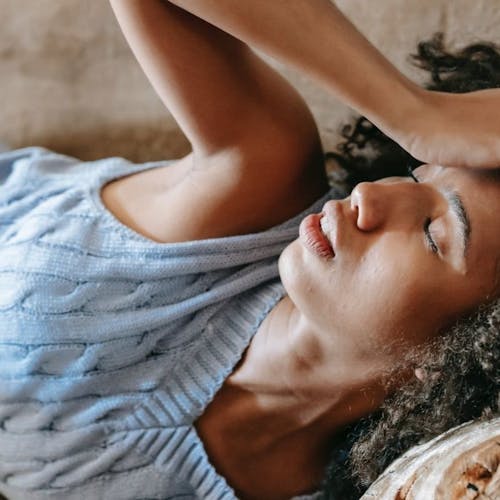This website uses cookies to enhance the user experience. By using Yoppie you are agreeing to our use of cookies.
Endo Feels: Endometriosis & Mental Health
Written by Yoppie
07 Feb 2022
What are the physical symptoms of endometriosis?
What are the emotional symptoms?
What’s causing these emotional symptoms?
What about my partner’s mental health?
My endometriosis is taking over my life. What can I do about it?
Those with long-term endometriosis symptoms will know it can take over your whole life. From career to relationships to simply doing your weekly food shop; everything is affected when symptoms arise, and while sometimes they only show up during your period, this isn’t always the case, and the mental health symptoms of endo can appear any time. Let’s look at what’s causing them and how to cope…
What are the physical symptoms of endometriosis?
Endometriosis is a condition where tissue that’s supposed to grow in the uterus grows elsewhere in the pelvis, like the ovaries and fallopian tubes. The main physical symptoms of endo typically happen in conjunction with your period - but not always.
These include pelvic pain, cramping, lower back and abdominal pain, pain during or after sex, pain when going to the toilet, excessive bleeding, bleeding between periods, fertility issues, fatigue, and more. Just a whole lot of pain and discomfort really! Everyone experiences different levels, but whether symptoms are mild for you, or severe and debilitating, you could still experience emotional symptoms alongside.
What are the emotional symptoms?
These can include low mood, anxiety, depression, irritability, and more. One 2013 study found people with endo had a lower quality of life, with the reasons being primarily chronic pain and dyspareunia (pain during sex). The study found around 86% of 109 patients reported depression symptoms, while 87% reported anxiety symptoms.
What’s causing these emotional symptoms?
According to a 2017 literature review, people with endometriosis reported high incidences of psychiatric conditions like depression and anxiety, and while research suggests there is a link between the two, it’s not clear whether or not endo directly causes depression. Here are some of the other potential causes:
Pelvic pain
A 2018 meta-analysis suggested endo sufferers who experienced pelvic pain as a primary symptom had significantly higher rates of depression. Researchers recommend further study in this area, as it’s unfortunately difficult to untangle this vicious cycle: your endometriosis causes chronic pelvic pain, which leads to psychological distress, which leads to increased pelvic pain, and the cycle continues.
Fatigue
If fatigue is your primary endo-related concern, this could be what’s causing your emotional symptoms. Endo fatigue happens when the body tries to get rid of diseased tissue, causing cytokines (proteins that are inflammatory modulators) to be secreted, causing fatigue. Endo-specific fatigue can cause a change in attitude; a good example of this is if you have ever found yourself skipping day-to-day activities when you’re normally a social butterfly.
Low self-esteem
Studies have also found those with endometriosis sometimes suffer from lower self-esteem and negative body image due to, for example, limitations the body experiences when in pain, or physical changes from endo surgery scars, weight gain from hormonal therapy, and more.
Fertility issues
Endometriosis is known to cause fertility issues for some people, so those who are trying for a baby and struggling to conceive may also experience emotional symptoms such as depression and anxiety.
Difficulty being diagnosed
And then there’s the fact that as of 2017, getting an endo diagnosis in the UK took on average 7.5 years. Yes, years. One study titled ‘The social and psychological impact of endometriosis on women's lives’ stated “Several papers suggest that prior to diagnosis, women commonly experience repeated visits to doctors where symptoms are normalized, dismissed and/or trivialized, resulting in women feeling ignored and disbelieved.”
What about my partner’s mental health?
Very good question! If you are in a relationship and suffering from endometriosis, or you are in a relationship with someone who has the condition, it can affect the mental health of both partners. It’s difficult to see a partner in pain, and this can have a negative impact on the quality of your life together; work, social responsibilities, childcare, financial responsibilities, your sex life, everyday tasks around the house and more, it’s all at risk of disruption.
Whichever side of the coin you find yourself on, communication is key. As the person in pain, sharing what you need will help your partner learn how to support you, and remember you can both attend a GP appointment together if you feel comfortable, to support each other, absorb information, and discuss the best possible treatment for you and your family.
My endometriosis is taking over my life. What can I do about it?
If you are experiencing any of the symptoms mentioned above, under no circumstances should you be ignoring the pain or downplaying it - whether you suspect endometriosis or not, go see your doctor without delay.
Although historically many people have struggled to get a diagnosis for endo, there is now much more awareness around this condition, so speak to your doctor about possible treatments which may include pain medications, hormone therapy, fertility treatment, and in some cases surgical treatments. Treating the underlying endometriosis can have an immediate and significant positive impact on your mental health.
Dealing with chronic pain is a notoriously difficult thing to handle, and although your doctor can help you get a proper diagnosis and improve your symptoms, in the meantime maintaining a healthy lifestyle (such as exercising when possible and eating nutritious foods) can help you feel more in control of your symptoms.
In addition, joining a community of others with similar issues could provide a place to talk it out. Endometriosis UK has a list of support groups focused on living with endo, and you can also join our Full Stop FB group to discuss it with others suffering from their own period-related conditions.
Got a question about endometriosis and mental health? You can always reach out to our friendly team on our Instagram at @itsyoppie. Don't forget that our personalised period box can get organic tampons, PMS supplements and much more delivered easily and regularly through your letterbox, which is one big load off your mind each cycle.
Section jump
Back to top
Subscribe To Our Newsletter
YOPPIE





© 2026 Yoppie is a registered trademark of Phlo Technologies Ltd.
Yoppie's supplements are not a substitute for a varied diet and healthy lifestyle and are not intended to diagnose, treat, or cure any disease. If you are pregnant, breastfeeding, have a medical condition or are under medical supervision, please consult with your doctor before taking any of our products.






